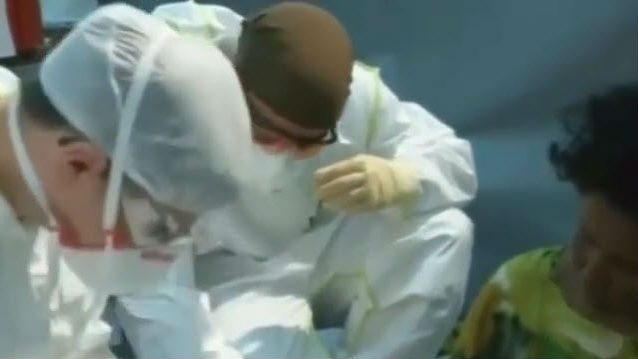Migrant Journeys: Baby Born at Sea

German navy staff helped deliver a Somali migrant's baby hours after the mother was rescued from the Mediterranean Sea this week.
Rahma, 33, from Mogadishu, gave birth to a baby girl, Sophia, on board the German rescue boat 'Schleswig Holstein' as it headed for the Italian coast. She was traveling alone at the end of a five-month journey.
Sophia, who weighed 3kg (about 7 pounds) at birth, is doing well. She is thought to be the first baby ever born on a German naval vessel.
A DANGEROUS JOURNEY
Rahma was one of 4,000 migrants rescued recently, as, every day, hundreds of people from the Middle East, Africa and Asia gather their families to board rickety, unseaworthy vessels bound for Europe. These people leave their homes with nothing more than the clothes on their back, the $1,500 fare required by smugglers to board an over packed ship and visions of life, liberty and security in their mind’s eye.
According to the International Organization for Migration (IOM), nearly 190,000 people have attempted the harrowing journey across the Mediterranean to Europe in 2015. And more than 2,400 have died trying, making it the world’s most dangerous migrant route.
The majority of the people crossing the Mediterranean this year have landed in Italy (about 97,000) and Greece (about 90,000). Despite the rapidly rising death toll, migrants are undeterred as they desperately line up hoping they will be the fortunate individuals who complete the journey unscathed.
The reasons for migrant deaths are numerous, but the result is always the same. In April, a ship capsized crossing the Strait of Sicily, killing more than 900 people.
On August 5, a fishing boat carrying about 700 African migrants capsized in the Mediterranean. Despite joint rescue efforts by the Irish Navy and Italian military, more than 200 drowned and several more were hospitalized. The fishing vessel’s five North African human traffickers were arrested amid reports that they beat and threatened passengers’ lives with knives and clubs.
On August 26, a Swedish rescue team made a grisly discovery when they cut open the deck of a migrant boat found north of Libya. The rescue team found the corpses of 51 migrants who died attempting to transit the Mediterranean. Traffickers herded nearly 500 people onto the vessel and the Italian Coast Guard reported that the 51 casualties died due to asphyxiation.
UNPRECEDENTED NUMBERS
Though illegal migration has been an issue for decades, casualty numbers have reached unprecedented highs. In 2014, about 3,150 migrants died crossing the Mediterranean and at the current pace, 2015 could exceed 4,000. While the number of migrants attempting to transit has spiked, a decreased effort in saving lives could be another factor.
The Italian government led a search-and-rescue mission called Operation Mare Nostrum from October 2013 to October 2014 which saved more than 130,000 lives in that period. The mission had a budget of about $12 million per month and offered migrants food, shelter and aid in applying for asylum.
Mare Nostrum, which means “our sea” in Latin, was funded by the Italian government with no financial support from the EU. Italy was unable to maintain the program at such a heavy cost and multiple EU Member States viewed the initiative as an aid to illegal immigration.
The EU replaced Mare Nostrum with Triton. Triton operates with a much smaller $3 million budget and its objective is border patrol rather than rescue. Following the April incident in which 900 migrants died, Italian Prime Minister Matteo Renzi urged the EU to expand its goal from simply stopping smugglers to also saving lives.
Though the response hasn’t been as strong most would like, the EU has seemed to raise its effort in dealing with the ongoing crisis. The EU plans to provide the nations dealing with the heaviest volume of migrants at least $33.4 million. And Greek officials have said they will meet with EU officials soon to discuss how it to integrate migrants into its population.
